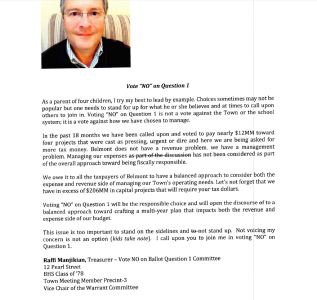Photo: Elizabeth Allison.
Move over, Koch brothers and Tom Steyer; you may think you have a big influence on politics, but you guys have nothing on Elizabeth Allison.
According to a campaign finance report filed March 30 with the Belmont Town Clerk, the Chair of the “Vote No on Ballot Question 1” committee has all but self-financed the effort to defeat the Proposition 2 1/2 override before voters on April 7.
The report which is filed eight days before the election with the Town Clerk shows Allison contributing $5,000 of the $5,640 given to the committee – about 91 cents of every dollar taken in – which saw a grand total of six residents donate to the “No” committee since mid-March.
Of the committee’s leadership, both Campaign Treasurer Raffi Manjikian or Robert Sarno failed to contribute to the fund (although Sarno’s wife, Judith, put in $100) while Jim Gammill pony upped $10.
In addition, Allison made two “in-kind” contributions totaling $1,642.62, raising her total tally to $6,642.62.
On the other side of the ballot question, the “Yes for Belmont” Committee shows a far greater depth in the number of contributors and total money raised. Nearly 80 residents gave less than $50 and 66 more than $50 for a total of $17,385 raised from more than 145 residents since Jan. 1. On top of an opening balance of approximately $6,500, the “Yes” side had a little more than $23,900 on hand.
Nearly all the money raised on both sides have gone to print firms to create yard signs and other promotional material.
Going into the critical final week of the race, the “No” committee was running on empty with less than $200 in reserves while the “Yes” had $13,268.
Over in the Selectman’s race, the incumbent Andy Rojas flexed his money-raising muscles by taking an impressive $21,000 from about 80 contributors, which added to a running balance in his war chest of $11,300, gave the current chair of the Board just about $32,300 to use in his race with challenger Jim Williams. Contributors included members of the Planning Board, former colleagues Ralph Jones and Liz Allison, the School Committee’s Lisa Fiore and former Boston Herald business writer Cosmo Macero.
Interestingly, while not contributing to the “No” committees coffers, Manjikian ($150) and Gammill ($200) ante upped for Rojas.
In the final eight day, Rojas was sitting on just over $19,000 for any last minute push.
First-time candidate Williams found about a quarter of the number of residents – and some out-of-towners – contributing as the Glenn Road resident raised $6,055 since mid-January. Unlike the “No” campaign, Williams has been able to spend very little over that time and can use his remaining $5,359 to impress voters in the final week of the campaign.
